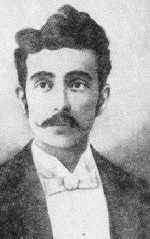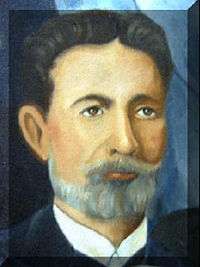Revolution of the 44
The Revolution of the 44 or Revolución de los 44 refers to a group of Salvadorian rebels, known as the 44 who rebelled against the government of the general Carlos Ezeta in 1894 in El Salvador. They took the city of Santa Ana. and forced the authorities and the president out.
Background
Carlos Ezeta became president of the country in 1891 after a treason. He had been under the orders of the general Francisco Menéndez Valdivieso from the presidential administration of 1887. Taking advantage of a celebration from a past military victory, on 22 June 1890, the loyal troops of Ezeta by surprise took the residence of the president where the celebrations were followed. There they proclaimed to the public that they had usurped power, during which Francisco Menéndez suffered a heart attack.
Revolution
Ezeta became president officially on March 1 of 1891. With his brother, Antonio, he directed a government from the quarter of the Second Brigade of Infantry. In the year 1894, the rejection to his government increased and numerous conspirators who were known to desire to uproot the government were persecuted. While many fled to Guatemala, on April 29 of that year, 44 rebels led by Doroteo Caballero came across the border from that country to Santa Ana. There they took the quarter and they demanded the surrender of the troops. The government was reorganized to put down the rebellion. Antonio Ezeta retreated to Coatepeque, where he requested reinforcements to be sent into Santa Ana. Although there was disagreement and disorganization over the control of the city, many guards were known to be sympathetic to the attacks. However, in spite of a new siege of the official troops and bloody attacks, the rebel forces managed to stay firm until May without Ezeta's men defeating them. However on May 16, official troops eventually overcame the rebels, largely helped by General Escobar who restored order to the situation.
Flight of Ezeta

On day 21, the event debilitated the governors elsewhere. The Ezeta brothers travelled to Chalatenango. New victories in the Malakoff hill and “Las Marias” on day 24 saw a rebel counter-attack. Antonio Ezeta later left for Coatepeque, and the rebels moved into Opico, near the capital, under the orders of the generals Tomás Regalado and Salvador Avila and the colonel Emilio Calderón. As this new force proved too powerful, the Ezeta brothers were forced to flee the country in exile by water. Provisional president Rafael Antonio Gutierrez entered the capital on 29 July 1894. Later, General Tomás Regalado who was instrumental in the downfall of Ezeta's regime became President of El Salvador from 1898 to 1903.
Bibliography
Vidal, Manuel (1961). Nociones de historia de Centro América. San Salvador: Editorial Universitaria.
